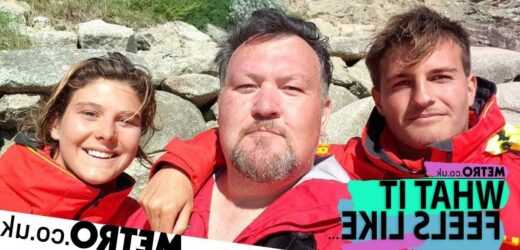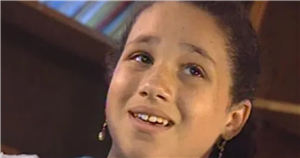I’d just gone down to Mawgan Porth beach in Newquay for a little bit of a paddle.
I was only going in waist deep, letting the waves move me about. I’ve got terminal cancer and the treatment has left me with lymphodema – a swelling of tissue due to it being full of lymph fluid. Being in sea water helps as it moves the tissue around and acts as a massage.
But as I stepped in, all of a sudden, it was like trying to walk up a water flume. The current hit me where I was and I immediately knew I was in trouble. It knocked me off my feet and dragged me in.
As a retired police officer, I’ve been in a lot of dangerous situations at work. I’ve been stabbed, I’ve had guns pointed at me, I’ve had dogs set at me and groups of people attack me.
I’ve saved lives and been in all sorts of high stress scenarios like accidents, suicide – you name it, I’ve seen it. As every cop has!
This was different.
In those instances, I would be the one that everyone looked to for help and I would think, ‘right I’m going to deal with this’.
The current hit me where I was and I immediately knew I was in trouble
But being caught in a rip current – it’s like a powerful, narrow river that drags you away from the shore – I was the one who was waving and shouting for help, stranded in a situation that I was completely unprepared for.
I have never felt so small as I did in that water, as I realised how completely insignificant we are.
The power and size of the waves sucked me under, carrying me up, down, left, right. I was being spun, tumbled.
When it momentarily abated every now and then, I didn’t know how long I’d have with a steady breath before the water knocked it out of me again.
I was on holiday with family in Cornwall for the week, and I’ve been going to that beach since the 1970s, when I was five years old.
I have spent hundreds of hours in that same water. I know that it gets rips, I’ve seen people rescued, I’ve seen all the news and I’m aware of the deaths there. It’s not something that I take lightly; I know how dangerous it is.
RNLI lifeguards aided 25,172 people last year, attended 10,687 incidents and saved 110 lives. In North Cornwall, North Devon and Somerset the RNLI Lifeguard service aided 1,244 people, attended 755 incidents and saved seven lives.
I go to that beach because I know it is RNLI patrolled and I entered between the red/yellow flags, which indicate the section of the beach that is being monitored, as I always do.
That was when I thought: ‘this is it’
I knew the RNLI’s safety messaging – when you get into trouble in the water you should float to live by leaning back, extending your arms and legs and resisting the urge to thrash around. But there was another adjacent rip – it was a perfect storm and kept taking me further and further out.
When I managed to glance back, I could see that I was a ridiculous distance of about 25m from shore.
When the swell is coming in, you can see no land mass in sight and you don’t know which way you are facing. It was taking me under and I was rolling; I’d come back up and get a breath and then it would take me under again. That was when I thought: ‘this is it’.
I was trying to shout and wave. There was one guy on a surfboard and I think he was struggling a little bit himself. I saw him and he was aware of me and that I needed help. I later found out that lifeguards had become aware of me at this point, too.
After about 10 minutes, I saw a lifeguard approaching me on a rescue board, which are big surfboards modified for saving lives. I’ve never been so pleased to see anyone in my life. I breathed a sigh of relief.
It was seconds before another lifeguard joined. One of them, Alex, tried to grab my hand but we kept getting separated as the swell was so strong. It was like being in a washing machine.
Their initial plan was to get me on their rescue board and then surf me back in, yet it was so rough that one of the rescue boards got caught in the rip and the three of us were clinging onto one.
The conditions were so rough, it’s amazing that she was able to get it out there to me
Apparently, the lifeguards were on the shoreline monitoring the beach. As soon as they realised someone was in trouble they radioed up for extra support before they entered the water.
A third lifeguard arrived on a rescue watercraft – specialised jet skis with a sled attached to the back, used to pull people back to safety. The conditions were so rough, it’s amazing that she was able to get it out there to me. I wouldn’t have thought it was possible. Apparently there were people on the shore saying, ‘who on earth is trying to launch in these conditions’, not realising it was the RNLI trying to save me.
After about 15 minutes, I managed to get onto the jet ski. A side effect of the chemotherapy treatment is neuropathy, which has caused a loss of feeling in my hands, making it even harder to get onto the rescue watercraft.
I lost my grip on the first attempt and then it took some effort to get me back into a position where I could drag myself onto it. We then headed back to the beach.
It wasn’t until I heard the engine stop and I lowered my foot, touching something solid, that I thought ‘oh thank god’.
Back at the beach the lifeguards did a medical assessment and checked I was safe. They initially thought they were going to be bringing me out on a stretcher and taking me straight to hospital, I think.
Once I told them my story they said, ‘clearly you are a fighter’.
There aren’t many words you can say in that situation, where people have literally just put their lives on the line for yours.
I hope they know how much I appreciate what they did. They saved my life.
The first ever World Drowning Prevention Day is on the 25th July, the RNLI is reminding people to stay and follow safety advice when they visit the beach or the coast. Visit rnli.org.uk for more information or join the conversation by using #DrowningPrevention
Do you have a story you’d like to share? Get in touch by emailing [email protected]
Share your views in the comments below
In this exciting new series from Metro.co.uk, What It Feels Like… not only shares one person’s moving story, but also the details and emotions entwined within it, to allow readers a true insight into their life changing experience.
Source: Read Full Article


